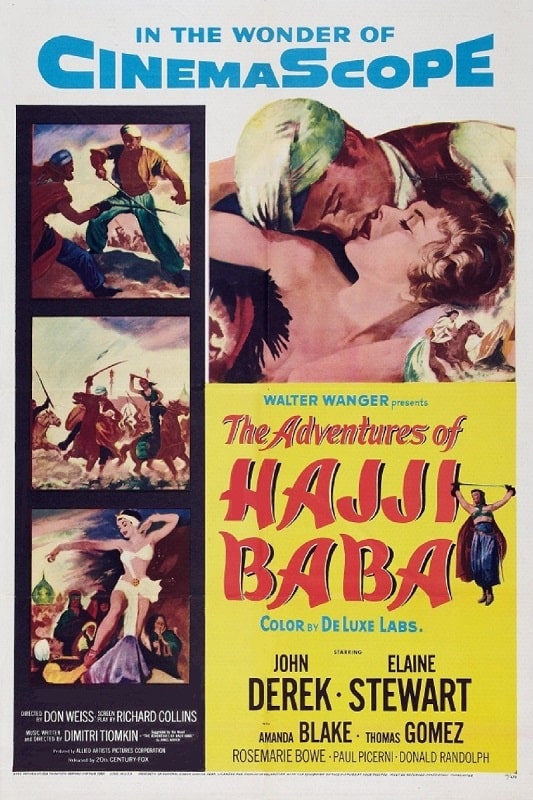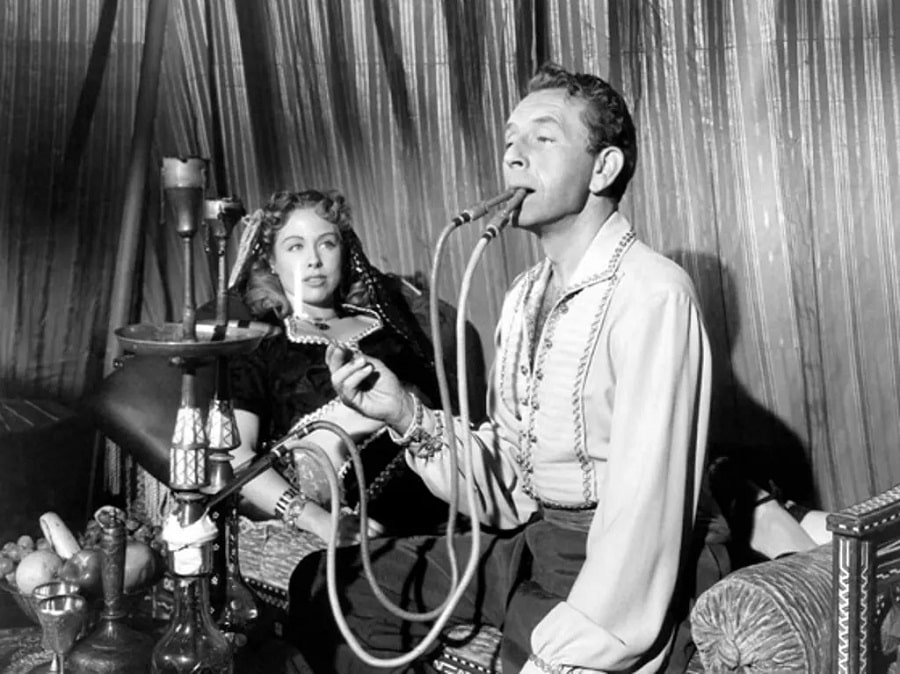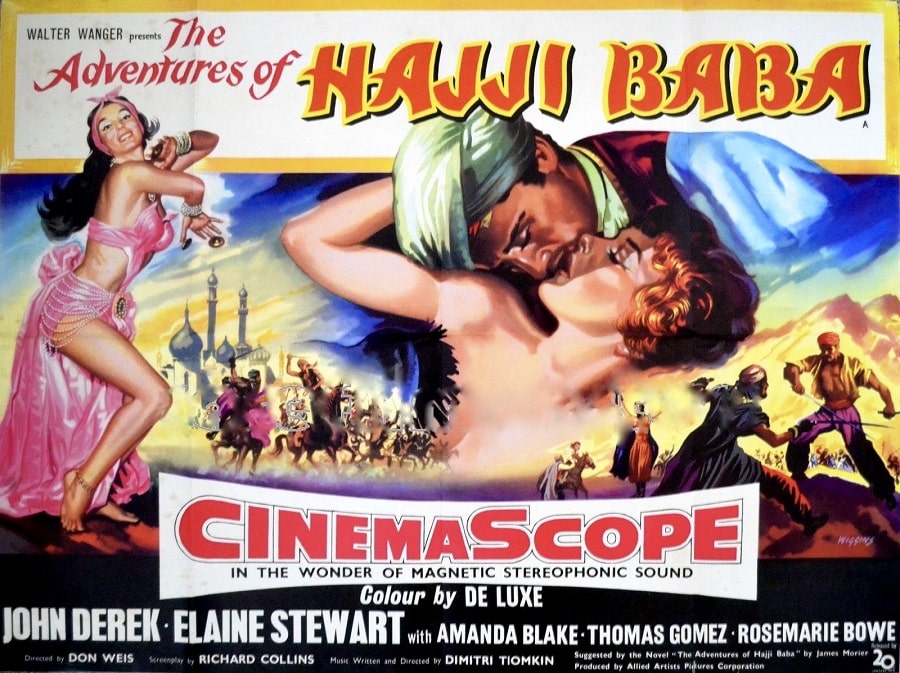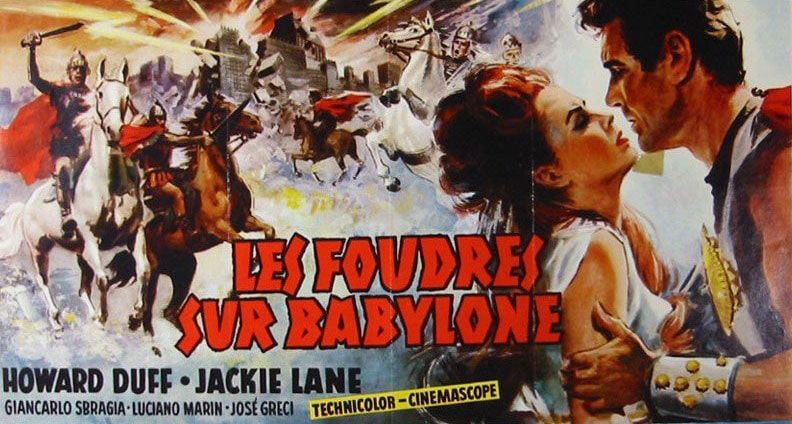Ellsworth’s Cinema of Swords: Near Misses in the Near East
The Adventures of Hajji Baba (USA, 1964)
Though the vogue for Middle Eastern Orientalism in 20th-century movies wasn’t entirely a scourge — where would the history of fantasy films be without Harryhausen’s 7th Voyage of Sinbad? — by and large it was mainly responsible for a lot of crap and claptrap. This goes way back to the Silent Era, peaking with The Sheik in 1921, the movie that made Rudolf Valentino a household word. Orientalist films set in the Near East almost always relied on visual clichés of colorful and exotic luxury, with female characters who exhibit a sensuality forbidden in the Christian west, and male antagonists who are cruel, dishonest, greedy, and lecherous. The protagonists, almost exclusively male, are either European or Americans of European descent, heroes who exemplify the “Western” traits of courage, daring, integrity, and respect for decency. Even when the heroes are themselves Middle Eastern, as in the movies we cover this week, they still embody those qualities deemed “Western” and are usually played by Europeans or Americans.
Casual racism aside, a better question might be, why were the vast majority of these movies so terrible? The answer has less to do with Orientalism in specific than with the approach to making pulpy adventure films in general, which was that they were regarded as cheap throwaways by the filmmakers and light entertainment by the viewers, popcorn features that just weren’t worth thinking too hard about. Arabian adventures, cowboy shoot-‘em-ups, jungle action movies, and gangster flicks all used formulaic stories, familiar tropes, and recycled costumes, and the extras playing Indians on the warpath one week played buccaneers in striped bellbottoms the next. Given the assembly-line nature of most genre adventure films, we’re lucky any of them are watchable at all. But hey, that’s what Cinema of Swords is here for, to highlight the gems and steer you away from the stinkers — the latter of which is definitely what we’re up to with this installment.
Siren of Bagdad
Rating: *
Origin: USA, 1953
Director: Richard Quine
Source: Turner Classic Movies
Paul Henreid and Hans Conried star in a sort of Arabian fantasy Road Picture, and you know what, I love those guys, but Henreid and Conried are no Hope and Crosby, especially with a script as weak as this one. Henreid is Kazah the Great, a magician with a traveling show featuring doofus assistant Ben Ali (Conried) and a bevy of dancing chorines in harem pants. The gag is that stage-magician Henreid can do real magic, but only when it’s funny. And you know what, in this film, that’s not very often.
Bagdad is ruled by an old usurper sultan who’s controlled by an evil grand vizier, and the real sultan’s daughter Zandi (Patricia Medina) is the true heir to the throne, but Kazah… aah, you know what, forget it. Allakazam! It never happened.
The Adventures of Hajji Baba
Rating: **
Origin: USA, 1954
Director: Don Weis
Source: Turner Classic Movies
Maybe the beautiful princess was the real treasure all along!
This film was “suggested” by James Justinian Morier’s popular 1824 novel Hajji Baba of Ispahan, but about all it takes from the book is the name recognition of its title and its stilted dialogue style, e.g., “By Allah, I shall slay you!”
But let’s give the movie credit for its good qualities: it’s a colorful spectacle shot in lush widescreen photography, it has a surging score by Dimitri Tiomkin, who also wrote a goofily endearing theme song sung by Nat “King” Cole, it’s fast paced and doesn’t lag, and it features a gang of fierce female bandits called the Turcoman Women, escaped slaves who fight with scimitars and sash bolas, which is pretty great.
However, those Turcoman Women wear a lot of lipstick, because this film is an example of what our queen of the swashbucklers, Maureen O’Hara, called a “tits and sand” movie, a throwback to the Sheik of Araby films of the silent era, but updated to the Fifties with snappy patter — or patter that would be snappy if it wasn’t dreck like, “I seek adventure as some seek wine.”
This awful dialogue is delivered in performances every bit as stiff as the script, from the leads on down, starting with pretty lad John Derek as Hajji Baba and pretty lass Elaine Stewart as Princess Fawzia, who should have been thrown out of the Screen Actors Guild for this travesty. The rest of the cast is no better, not even the villains, whom you can usually count on to chew the scenery in an entertaining fashion when the leads are wooden mannequins. Not this time.
Okay, some plot: despite the warnings of her father the Caliph of Ispahan, the selfish and petulant Princess Fawzia is determined to wed an obvious villain, the power-hungry Prince Nur-El-Din, and sets off in disguise to meet the agent of the prince who will take her to him. Hajji Baba is a humble barber with ambitions to make his fortune; he stumbles on this plot, takes the place of the agent, and engages to take the princess to Nur-El-Din in exchange for her emerald ring and 100 dinars. The princess is insulted that he’s more taken with the ring than with her beauty but he fobs her off, which is how you know they’re fated to fall in love.
They head out into the desert (southern California doing a good job of standing in for Persia) and into a series of caravans and captures and escapes and betrayals, all ornamented by bevies of half-clad starlets. Hajji is supposed to be a resourceful and charming rogue with amusingly flexible morals, but Derek is unconvincing in the role and doesn’t look like he believes the drivel he’s saying even as he says it. The horses are handsome and the costumes are sumptuous, but the jokes aren’t funny and the scimitar fencing is crap. So naturally it was a solid hit at the box office. John Derek went on to lend his last name to his fourth wife, Bo Derek, who maybe you might have heard of.
War Gods of Babylon
Rating: **
Origin: Italy, 1962
Director: Silvio Amadio
Source: Retromedia DVD
This quasi-historical epic is done in by its ponderous self-importance. Babylon has been conquered by Assyria and plots to throw off Assyrian rule. The wise Zoroaster, the mighty Hammurabi, Sardanapalus — basically everyone from the period whose name you might recognize — all get thrown into a stew of melodrama that comes down to a fight over the love of a cute young peasant woman named Mirra (Jackie Lane). The Assyrian king, Sardanapalus (Howard Duff) and the prophet Zoroaster (Arnoldo Foà) have some stage presence, but when actors have to say dumb lines like, “Power digs deep trenches, even between brothers,” and “When you weep, your beauty is magnified!”, they’re fighting a lost cause.
Most of the film is just guys in ancient armor spouting lines like those at each other, and the eventual battles between Assyria and Babylon can’t save it, especially since those clashes are perfunctory and uninteresting. When the dull fighting has gone on long enough, Sardanapalus blasphemes against the gods, there’s a divine flood with cheesy special effects, the walls come tumbling down and love dies on a pyre of hubris. I hate when that happens.
The collected Cinema of Swords will be published in June 2023 by Applause Books. Watch for it!
Where can I watch these movies? I’m glad you asked! Many movies and TV shows are available on disk in DVD or Blu-ray formats, but nowadays we live in a new world of streaming services, more every month it seems. However, it can be hard to find what content will stream in your location, since the market is evolving and global services are a patchwork quilt of rights and availability. I recommend JustWatch.com, a search engine that scans streaming services to find the title of your choice. Give it a try. And if you have a better alternative, let us know.
Previous installments in the Cinema of Swords include:
For the Horde!
The Princess Bride Redeems the 80s
Samurai Stocking Stuffers
Moonraker! (No, Not That One)
Cinema of Swords Book Announcement!
Fury of the Norsemen
Samurai With a Twist
The Barbarian Boom, Part 7
Avenging Women
Mondo Mifune
LAWRENCE ELLSWORTH is deep in his current mega-project, editing and translating new, contemporary English editions of all the works in Alexandre Dumas’s Musketeers Cycle; the sixth volume, Court of Daggers, is available now as an ebook or trade paperback from Amazon, while the seventh, Devil’s Dance, is being published in weekly installments at musketeerscycle.substack.com. His website is Swashbucklingadventure.net. Check them out!
Ellsworth’s secret identity is game designer LAWRENCE SCHICK, who’s been designing role-playing games since the 1970s. He now lives in Dublin, Ireland, where he’s a Narrative Design Expert for Larian Studios, writing Dungeons & Dragons scenarios for Baldur’s Gate 3.




The only one of these I’ve seen is Hajji Baba (which I own; that was probably a mistake). I don’t see that changing any time soon.
Another Ellsworth’s Cinema of Swords? By Allah, these films are bad!
I remember seeing the Hadji Baba film (my aunts thought Derek was gorgeous) but I’ve never even heard of the other two and I’m gonna keep it that way. Many thanks (again) Mr. Ellsworth, for suffering through this junk so we don’t have to!
Mispelled Hajji, dang it.